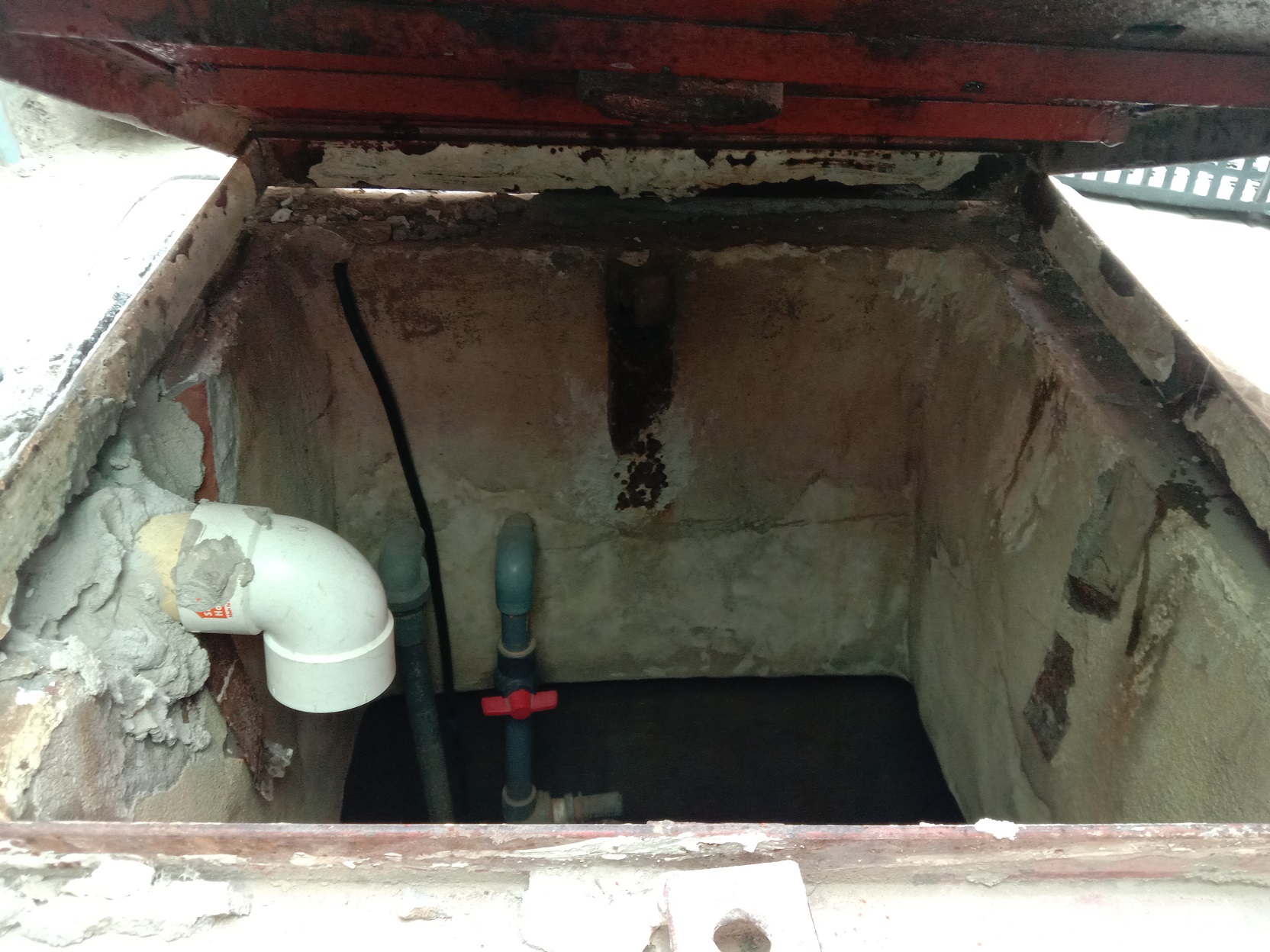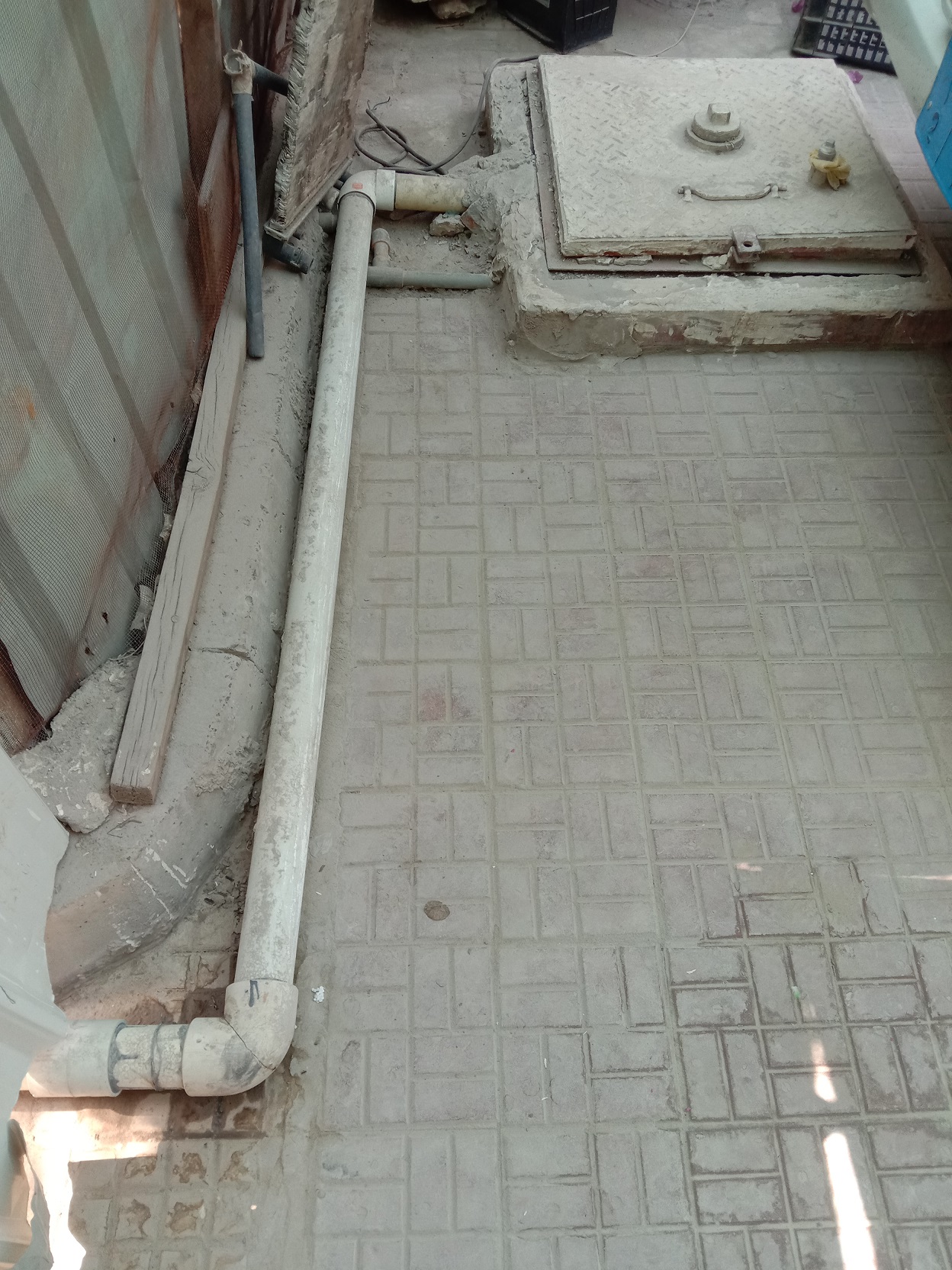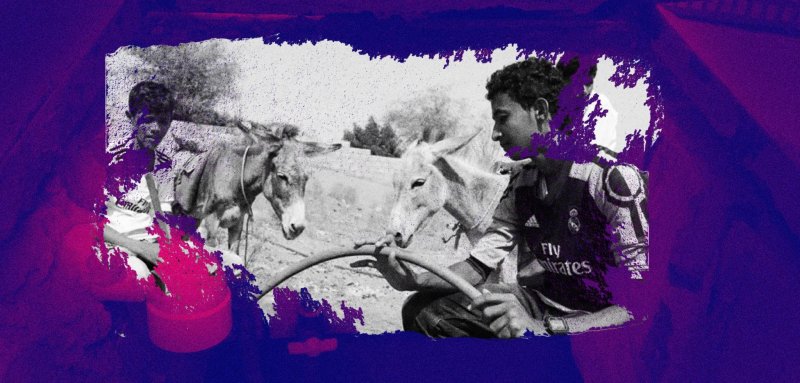“We used to save water in order to ration the bill, and didn’t have to buy it from water tankers (called ‘alwhite’ in the local dialect). But for years, water has been rarely reaching us, and in very small amounts in the past year,” says Fatima Ali, a resident of the al-Rawda area north of the Yemeni capital, Sana’a.
She tells Raseef22, “We have become completely dependent on water tanks and things have become austere, yet it costs us 20 thousand riyals ($36 US dollars) twice a month to buy a water tank, while my husband’s salary is only 70 thousand. All this made me think about storing rainwater”, embodying the reality of Yemenis who have lost water security, among other things at a time when the country’s sovereignty and the rights of its citizens are being violated.
Harvesting rainwater in homes is a practice worth trying, according to Karima Lotf, a resident of the al-Jarraf neighborhood in Sana’a. She has owned a ground tank for 25 years to store government service water, or what Yemenis call “the project”, and sees no concerns over the use of rainwater.
“It costs us 20 thousand riyals ($36 US dollars) twice a month to buy a water tank, while my husband’s salary is only 70 thousand”
“Rainwater doesn’t need sterilization, it only picks up dust from the air and the dust takes a day to settle at the bottom of the tank, after which people won’t find a difference,” she tells Raseef22. She adds that the lack of chlorine in the rain makes it healthy water.
Negotiations over the price of water tanks have worn out those who sell them to people. Saleh Ali, who has owned a tank since 2007 in Sanaa’s Musayk area, says, “What we are asking for is the value of the water, the quantity of which is decreasing, in addition to the price of oil derivatives that we buy from black markets, but people are under very difficult conditions, and this is what drives me to provide them with as much water as they have money, and to distribute water to the tanks of neighbors who share the price of ‘alwhite’.”
An eternal water crisis
Storing rainwater is an old concept in Yemeni villages, where its people make sure to build a room under the house called the “vault” to store grain and fodder, along with digging a “pool” to harvest rainwater for the winter days. Today, some Yemenis in the cities are turning to utilizing summer rainwater by storing it in tanks the way their grandparents and their fathers stored it in wells and dams. It is worth mentioning that rain has two main seasons in Yemen, the first is in the spring while the second is in the summer.
Yemen is one of the most water-scarce countries in the world. It suffers from water insecurity and is threatened by drought and desertification. The per capita share of water is about 130 cubic meters per year, while the global water poverty line is 1,000 cubic meters per person.
Storing rainwater is an old concept in Yemeni villages, whose people build a room under the house called the “vault” to store grain, and dig a “pool” to harvest rainwater for the winter. Rain has two seasons in Yemen, the first is in spring and the second is in summer
The country’s groundwater level is rapidly decreasing to levels that warn of a humanitarian catastrophe. After wells have dried up, and the water levels in others have significantly lessened, the quality of water has deteriorated and the cost of extracting it has risen, while agriculture, especially the khat (qat) tree, has depleted the wells. Experts at the Water Resources Authority (NWRA) and the Ministry of Agriculture are also warning of the drying up of the Sana’a Basin, which is a low plain surrounded by mountain ranges, where rainwater collects and turns into a source of water supply for 6,000 wells.
One of the biggest water problems in Yemen is that the government water service supply is limited to the center of major cities, while it is scarce in the rest of the regions and does not meet any needs. The Authority of Water and Sanitation is struggling to continue operating, and this is subject to its support with oil derivatives, operating expenses, and the payment of consumption bills by consumers (subscribers). The crisis of oil derivatives has also affected the ability of the authority and the owners of wells to extract water at a cost commensurate with the average financial capacity of Yemenis.

One of the storage places for rain water in Yemeni homes - Raseef22 special report
This pushes people to rely fully or partially on water tanks, while the poor and the destitute have resorted to survive on aid from philanthropists, organizations, and water from mosques where people stand in line day or night for hours on end to get a few liters of water of questionable cleanliness, which has prompted some organizations to distribute sterilizing capsules in the slums.
This contributes to the suffering of thousands of Yemenis from malnutrition as a result of contaminated water that transmits disease, weakens immunity, and causes chronic diseases.
This idea can be encouraged by spreading it and developing a treatment to sterilize water in homes
Water awareness
The process of storing rainwater begins with cleaning the floor and waiting for the rain to fall. The water then goes to drainage outlets from the rooftops of the houses and to the ground reservoir. Today, we can see this in more than one Yemeni region.
The area of al-Aruq in the Bani al-Harith District, located in the north of the Sana'a governorate and the largest district of the governorate, is a modern example of people applying the idea of storing rainwater, where people tend to buy residential land in this area at a low price due to its distance from the capital and its absence of service projects, and then building or selling it as an area of land or residential building years later. In this area, rainwater storage has become an accepted idea and even an emergency option and an advantage when offering the property for sale.
With the water service faltering and ‘alwhite’ consuming a quarter of the family’s budget, 50-something Bashir al-Mahya, who lives in the al-Sanina area and works as a plumber while traveling between governorates, found additional income from the idea of storing rainwater.
He tells Raseef22, “It’s a clever way that enables people to take advantage of this water that usually goes to waste, with a possibility of installing a switch to control and determine when to take in rainwater and when to do without it. A ground tank is not necessarily required, since it’s enough to have a factory tank of any size.” He goes on to add, “During my work in plumbing, I found houses that were gathering and storing water in every bowl and container they could find in front of them when the rain fell. It’s all about the need!”.

One of the storage places for rain water in Yemeni homes - Raseef22 special report
The importance of encouraging the idea
Speaking to Raseef22, Abdullah Saleh, a wells engineer in the water project, explains the idea of storing rainwater, “Rain is what feeds groundwater, and draining the wells and dams without replenishing the amount of water lost, leads to the drying up of the wells or a decrease in the water level in them to the point of their quality deteriorating.” He warns of the importance of the idea together with the unpredictability of the country’s water future, and whether it will remain threatened by drought and scarcity or not, especially with the climatic changes that have recently made the sky rain in winter and led to snowfall, which is considered a rare event in the country.
He adds, “Yemenis have no choice but to store rainwater from surface water run-off, and here integrated management is necessary, as well as sterilizing and examining the water, and both are subject to a budget for this,” warning of the lack of nationwide plans to collect water, in light of the randomness of construction without proper housing plans, the deterioration of the infrastructure and water networks, as well as pollution by toxic waste. He continues, “Of course it is not possible to impose the construction of a collection reservoir for water in light of the extreme poverty, but this idea can be encouraged by spreading it and developing a treatment to sterilize water in homes.”
“It’s a clever way that enables people to take advantage of this water that usually goes to waste, with a possibility of installing a switch to control and determine when to take in rainwater and when to do without it”
Usually, Yemenis build independent houses with limited space and modest capabilities. Very few are residential buildings or skyscrapers that are run by a real estate company, or those built by the state, for there to be a possibility for the government to enforce every property owner or landlord to dig a reservoir for water collection.
Here, we can benefit from the experience of Jordan, one of the world’s poorest countries in terms of water. The country, which is facing significant challenges in this regard, is now moving towards relying on rainwater. In 2020, it approved the construction of collection water wells in the building system to enhance water harvesting within an integrated plan in order to reduce water loss and reduce pressure on water demand. The size of the collection tanks was taken into account depending on the amount of rainfall and surface area, while providing safety requirements including making sure the building materials of the wells won’t affect the natural properties of the water.
It remains to be said that the basis of all projects to preserve the wealth of wasted water in Yemen is the expansion of the construction of dams and water barriers, the maintenance and expansion of the supply network, the imposition of control to reduce the indiscriminate drilling of wells, and making sure to store rainwater and benefit from it to the utmost.
Raseef22 is a not for profit entity. Our focus is on quality journalism. Every contribution to the NasRaseef membership goes directly towards journalism production. We stand independent, not accepting corporate sponsorships, sponsored content or political funding.
Support our mission to keep Raseef22 available to all readers by clicking here!
Interested in writing with us? Check our pitch process here!





